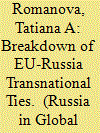|
|
|
Sort Order |
|
|
|
Items / Page
|
|
|
|
|
|
|
| Srl | Item |
| 1 |
ID:
186776


|
|
|
|
|
| Summary/Abstract |
The article aims to explore the causes and consequences of the profound
change in transnational ties between Russia and the European Union after
February 24, 2022, that is, contacts that bypass official authorities and
directly involve Russian and EU citizens (in business, science, education,
culture, sports, and non-governmental organizations’ activities). The
breakdown of ties is unique in speed and scale. Five causes of the breakdown
of transnational ties have been identified: the position of EU officials
towards Russian society; the rise of the war paradigm in the West and its
pluralization (that is, its implementation on different tracks); reputational aspects; the perception of Russian society as homogeneous in supporting
the operation in Ukraine; and pressure from Ukraine itself. As a result,
relations between Russia and the EU have become more politicized and
have lost the potential for resilience and mutual socialization. By limiting
transnational ties, EU players help Russia’s ruling elite consolidate society
and limit alternative thinking; they also change the vector of EU civilian
power. At the same time, the rupture of transnational ties delivers a major
blow to the universality of Western institutions, which will determine the
pace of recovery both for Russian supporters of close relations with the West
and for their opponents. The article also pinpoints certain mechanisms for
rebuilding transnational ties in the medium term.
|
|
|
|
|
|
|
|
|
|
|
|
|
|
|
|
| 2 |
ID:
131701


|
|
|
|
|
| Publication |
2014.
|
| Summary/Abstract |
This article addresses the problématique of the subject and the subject-object dichotomy from a post-objectivist, reflexivist perspective informed by a 'strong' version of reflexivity. It clarifies the rationale and epistemic-ontological requirements of strong reflexivity comparatively, through a discussion of autoethnography and autobiography, taken as representatives of other variants of reflexive scholarship. By deconstructing the ontological, epistemic, and reflexive statuses of the subject in the auto-ethnographic and auto-biographical variants, the article shows that the move from objectivism to post-objectivism can entail different reconfigurations of the subject-object relation, some of which can lead to subjectivism or an implicit positivist view of the subject. Strong reflexivity provides a coherent and empowering critique of objectivism because it consistently turns the ontological fact of the social situatedness of knowledge into an epistemic principle of social-scientific research, thereby providing reflexivist scholars with a critique of objectivism from within that allows them to reclaim the philosophical, social, and ethical dimensions of objectivity rather than surrender them to the dominant neopositivist tradition.
|
|
|
|
|
|
|
|
|
|
|
|
|
|
|
|
|
|
|
|
|